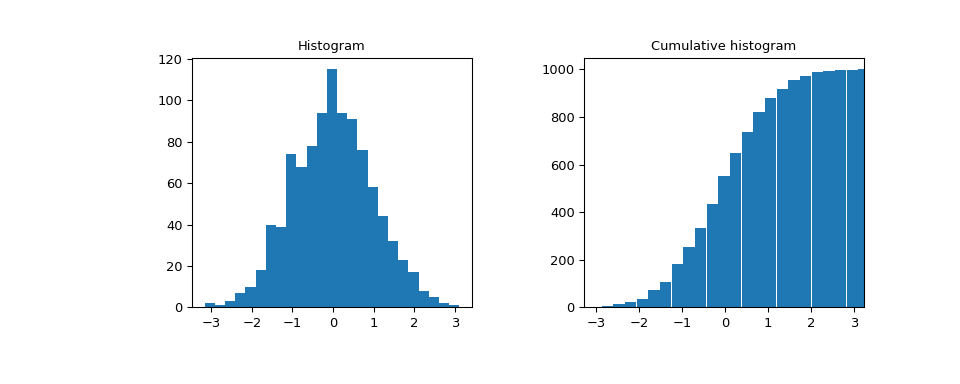scipy.stats.cumfreq¶
- scipy.stats.cumfreq(a, numbins=10, defaultreallimits=None, weights=None)[源代码]¶
使用直方图函数返回累积频率直方图。
累积直方图是一种映射,它计算所有面元中直到指定面元的观测值的累积数量。
- 参数
- aarray_like
输入数组。
- numbins整型,可选
用于直方图的仓位数。默认值为10。
- defaultreallimits元组(下、上),可选
直方图范围的下限和上限。如果未给定值,则为略大于 a 是使用的。具体地说,
(a.min() - s, a.max() + s),在哪里s = (1/2)(a.max() - a.min()) / (numbins - 1)。- weightsARRAY_LIKE,可选
中每个值的权重 a 。默认值为None,即为每个值赋予1.0的权重
- 退货
- cumcountndarray
累计频率的入库值。
- lowerlimit浮动
实际下限
- binsize浮动
每个存储箱的宽度。
- extrapoints集成
加分。
示例
>>> import matplotlib.pyplot as plt >>> from numpy.random import default_rng >>> from scipy import stats >>> rng = default_rng() >>> x = [1, 4, 2, 1, 3, 1] >>> res = stats.cumfreq(x, numbins=4, defaultreallimits=(1.5, 5)) >>> res.cumcount array([ 1., 2., 3., 3.]) >>> res.extrapoints 3
创建具有1000个随机值的正态分布
>>> samples = stats.norm.rvs(size=1000, random_state=rng)
计算累计频率
>>> res = stats.cumfreq(samples, numbins=25)
计算x的值空间
>>> x = res.lowerlimit + np.linspace(0, res.binsize*res.cumcount.size, ... res.cumcount.size)
绘制直方图和累计直方图
>>> fig = plt.figure(figsize=(10, 4)) >>> ax1 = fig.add_subplot(1, 2, 1) >>> ax2 = fig.add_subplot(1, 2, 2) >>> ax1.hist(samples, bins=25) >>> ax1.set_title('Histogram') >>> ax2.bar(x, res.cumcount, width=res.binsize) >>> ax2.set_title('Cumulative histogram') >>> ax2.set_xlim([x.min(), x.max()])
>>> plt.show()
